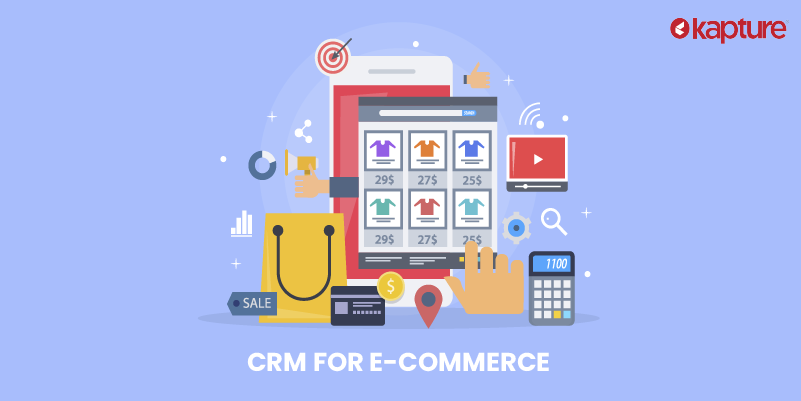It’s important to remember how instrumental customer relationships are for the growth and success of any business. A Customer relationship management system can help your business organize data and deliver personalized, memorable customer experiences in an easy manner. This is especially required if you’re a part of an e-commerce as business operations and management can get quite messy.

In addition to having interactions with your existing customers, a CRM platform lets you engage with your leads as well. For instance, using Kapture CRM, you can prioritize and filter your leads and customers from hundreds or thousands of customers easily. The right CRM solution can give your e-commerce business a competitive advantage in the market. E-commerce businesses leverage CRMs to build strong customer relationships and streamline their sales and customer support operations.
CRM solutions help e-commerce businesses (both B2B and B2C) increase conversion rates and optimize their marketing and customer support efforts. Thanks to CRM, your business can operate at an advanced rate and keep up with the market trend.
Here are some ways how a CRM software can improve your e-commerce business:
- Customer segmentation: Having an efficient CRM platform in place can help you deliver quick, personalized customer services. This can be done my filtering and segmenting your audience. You can segment your customers on the basis of gender, age, purchase history or any criteria that you wish to use. This also helps you in creating and sending out targeted ads.
- Enhanced customer engagement: CRM solutions can provide your business with an omni-channel support system that makes way for enhances customer engagement. For instance, using a CRM software, your support agents can interact with customers on their preferred channel of communication (chat, calls, e-mails) without having to switch applications. Additionally, cloud-based CRMs can provide you with a 360 degree customer view that will assist your agents in delivering seamless customer service experience.
- Real-time reports and analytics: Using a CRM solution, it’s easy to access a variety of real-time reports. In addition to testing the effectiveness of campaigns, these reports also help you in monitoring and measuring your agents’ performance. If your e-commerce business has an active call center, then you can enhance the quality of customer support calls by monitoring live calls as well. Just as you would optimize dtc landing pages to drive engagement, you can train your agents better by taking advantage of reports including data like call source, call flow, and duration.
- Ticket management: Regardless of the size of your e-commerce business, it can get tricky to manage a ticketing system manually, all the time. Most CRM solutions offer a ticketing system that automatically converts every incoming query into a ticket. The AI-powered solution resolves common tickets by itself. You can filter tickets, and hence attend to priority tickets first. Apart from this, a CRM platform can assign and route incoming tickets based on any criteria (language, location etc) that’s unique to your business.
- API Integrations: You can integrate all your internal and third-party systems to your CRM. This enables easy data flow within the teams or departments of your e-commerce business. For instance, you can integrate your payment or cloud telephony systems to your CRM and access information in one place.
- Lead management: With a CRM, it’s easy for you to stay on top of leads. You can segment them and get automated reminders for meetings and follow-ups. Through relevant reports, you can monitor the sales funnel and improve your marketing campaigns likewise.
- Quality customer interactions: Having an efficient live chat tool in place can help e-commerce businesses have multiple meaningful conversations at the same time. With pre-formatted text templates and AI-powered automated responses, you can be sure that all your leads and customers are promptly being attended to. Using live chat analytics, you can also map the incoming traffic of your website that has been coming through the chat. In some cases, using live chat, you can close deals and convert prospects into customers without the interference of an agent.
- Mobile CRM: If you have sales or support agents meeting prospects and customers, you would understand how important recording these details on-the-go is. Mobile CRM lets field agents access customer-related data and ticket details from anywhere. They can also check-in and check-out at customer location using mobile CRM.
Adopting the right CRM can not only streamline your sales and customer support service operations, but gives you a competitive advantage as well. You can build brand loyalty and reputation with a help of a strong CRM solution. You can now automate time-consuming manual procedures, manage leads and customer interactions with one CRM solution.
By choosing the right CRM, you can personalize your marketing and customer support, optimize your campaigns and automate your support operations. Ultimately, a CRM platform will help you get closer to your customers, understand their needs and cater to them accordingly. Get in touch with Kapture CRM today and request for a demo of the product.